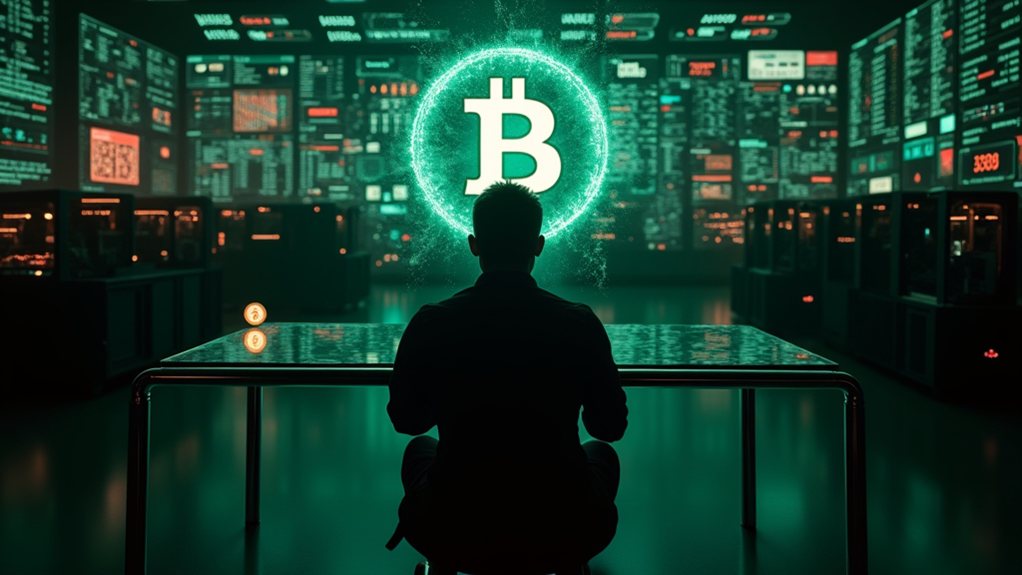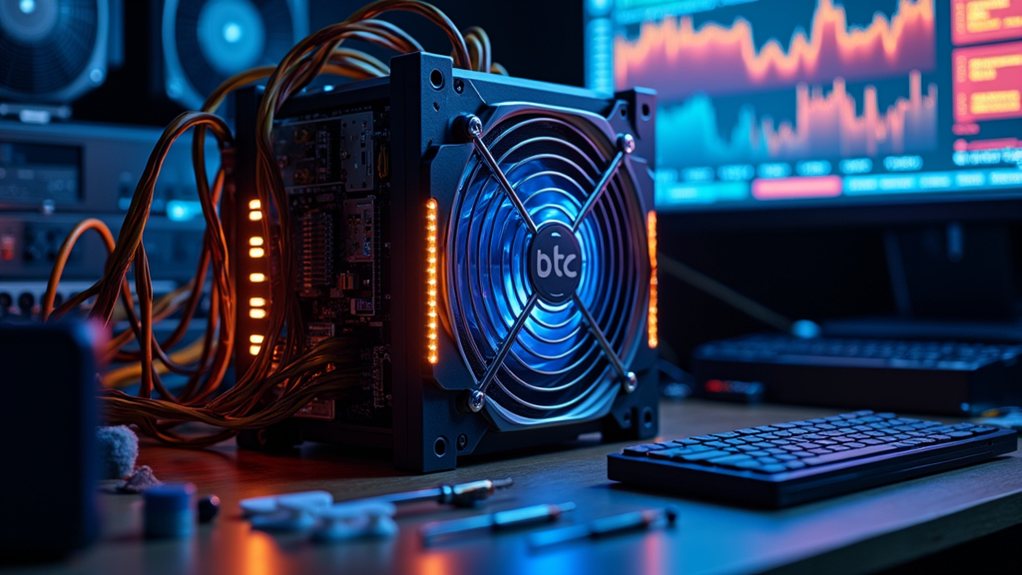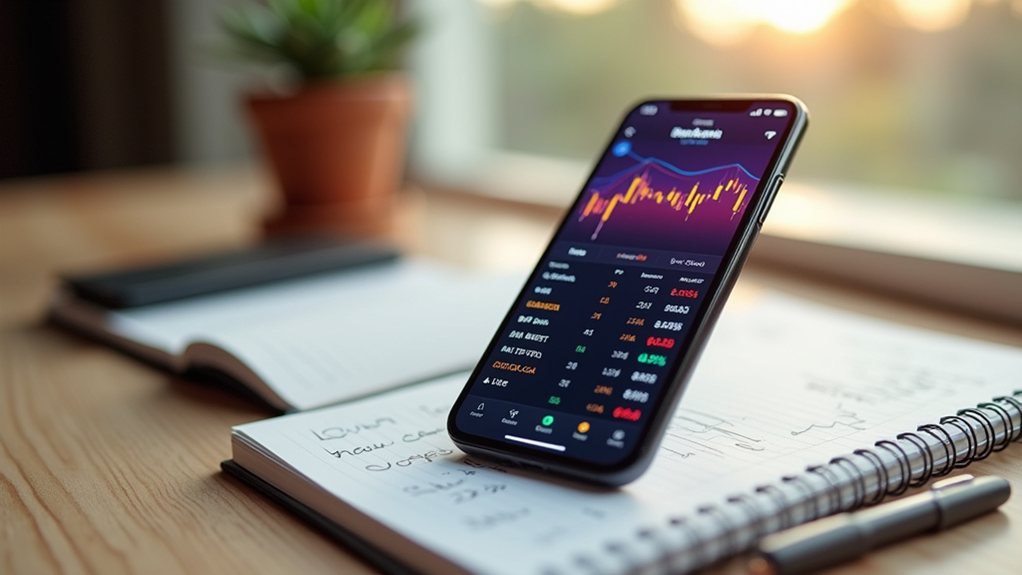Satoshi Nakamoto, Bitcoin's mysterious creator, holds the most Bitcoin with an estimated 1.1 million coins. That's about 5% of all Bitcoin that will ever exist. These coins, scattered across 20,000 addresses, have never been spent or moved since mining them in 2009-2010. Nobody knows Nakamoto's real identity or intentions. The crypto world watches nervously—if those coins suddenly moved, the market would probably freak out. The mystery deepens.

Mystery shrouds the world's largest Bitcoin holder. The enigmatic Satoshi Nakamoto, Bitcoin's creator, sits atop the cryptocurrency mountain with an estimated 1.1 million BTC. That's right—the person who invented Bitcoin also happens to own the most. Ironic, isn't it? These coins, mined during Bitcoin's infancy (2009-2010), remain untouched, scattered across roughly 20,000 addresses. Not a single satoshi spent. Ever. This dormant treasure fuels endless speculation about Nakamoto's intentions, identity, and whether those coins will ever move.
The second-largest holder isn't even a person. It's a company. MicroStrategy, led by Bitcoin evangelist Michael Saylor, holds approximately 499,096 BTC. They've gone all-in, using Bitcoin as their primary treasury asset to fight inflation. Their strategy? Raise debt, buy Bitcoin. Rinse and repeat. Other corporations have followed suit, though not as aggressively. Tesla, for instance, holds about 9,720 BTC—pocket change compared to MicroStrategy's stash.
Corporate giants are silently accumulating Bitcoin, with MicroStrategy leading the charge in this high-stakes financial revolution.
Governments are getting in on the action too. The U.S. government has seized approximately 205,515 BTC from various criminal enterprises. Bulgaria reportedly sits on a pile of 213,519 BTC—also seized. Funny how governments criticize cryptocurrency while simultaneously becoming major holders. These seized assets came primarily from dark web operations, contributing significantly to government holdings.
El Salvador has taken a different approach, adopting Bitcoin as legal tender and actively purchasing for national reserves. The concentration of Bitcoin in government hands raises questions about the cryptocurrency's future regulation. Despite Bitcoin being one of over 25,000 cryptocurrencies currently existing, it remains the dominant digital asset by market capitalization and adoption.
Among individual investors, the Winklevoss twins stand out with roughly 70,000 BTC. Remember them? The guys who claimed Mark Zuckerberg stole their Facebook idea. Well, they're Bitcoin billionaires now. They founded Gemini exchange to further cement their position in the cryptocurrency ecosystem.
Tim Draper scooped up 29,500 BTC at a government auction. Michael Saylor personally owns about 17,732 BTC, separate from his company's holdings. These individuals aren't just investors—they're true believers.
Private companies are accumulating significant amounts too. Block.one reportedly holds between 140,000-164,000 BTC. Tether Holdings, behind the USDT stablecoin, owns approximately 82,454 BTC. Collectively, private companies hold around 297,000 BTC. This growing corporate interest signals Bitcoin's shift toward mainstream acceptance.
The distribution matters. Only 4% of the global population owns any Bitcoin at all. The market remains highly concentrated among early adopters and institutional players. Nakamoto's dormant million-plus bitcoins represent about 5% of all bitcoins that will ever exist. If those coins suddenly moved, the market would notice.
Frequently Asked Questions
How Does Owning Vast Bitcoin Wealth Impact One's Personal Security?
Bitcoin whales face serious safety issues.
Physical threats? Yeah, they're real. Kidnapping, home invasions, surveillance—all on the table.
Digital life becomes a security nightmare with constant hacking attempts and phishing attacks.
Privacy? Good luck with that. Their identities get hunted, blockchain analysis tracks their moves.
Most damaging might be psychological toll—constant paranoia, trust issues, and social isolation.
Not exactly living the dream.
What Legal Challenges Do Mega Bitcoin Holders Face Worldwide?
Mega Bitcoin holders face a legal minefield.
Regulatory confusion reigns supreme—is it currency, commodity, or security? Nobody's quite sure. They're caught between privacy rights and transparency demands.
KYC/AML requirements clash with the whole "be your own bank" thing. Estate planning? A nightmare. Try explaining cold storage to probate courts.
And jurisdictional nightmares abound. Own Bitcoin in multiple countries? Good luck filing those contradictory compliance forms. What a headache.
How Do Bitcoin Whales Prevent Theft or Loss?
Bitcoin whales prevent theft through hardcore security measures. They stash most coins in hardware wallets kept in actual vaults. Multi-signature setups mean no single person can access funds. Dedicated devices, never touching public Wi-Fi. They're paranoid, for good reason.
Smart whales diversify across multiple wallets and addresses. Different wallets for different purposes.
Like having separate bank accounts, except with way more security. Makes sense when you're worth billions.
Do Largest Bitcoin Holders Influence Cryptocurrency Market Regulations?
Bitcoin whales absolutely influence crypto regulations. They've got serious lobbying power.
Major exchanges and institutional holders push for favorable tax treatment and clearer frameworks. It's not even subtle.
When big holders make moves, regulators take notice. Countries with large BTC reserves tend to develop crypto-friendly laws.
Whales fund development projects too, shaping the entire ecosystem.
Money talks. Big Bitcoin definitely has regulators' ears.
What Succession Plans Exist for Transferring Massive Bitcoin Holdings?
Massive bitcoin holders typically employ sophisticated succession strategies.
Multi-signature wallets, where heirs need multiple keys to access funds.
Dead man's switches that trigger automatic transfers.
Trust structures with crypto-specific clauses.
Some use "shamir's secret sharing" to distribute key fragments.
Cold storage with legal beneficiary designations.
The really paranoid? Time-locked smart contracts with gradual release mechanisms.
Market impact remains a concern—dumping billions in BTC would crash prices.
Not exactly a problem most people have.








